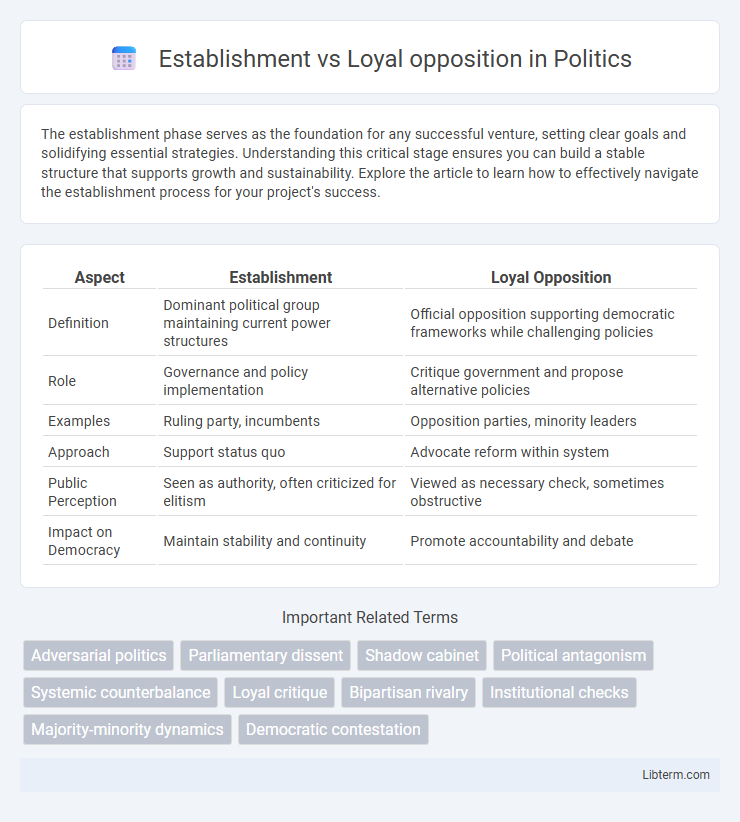The establishment phase serves as the foundation for any successful venture, setting clear goals and solidifying essential strategies. Understanding this critical stage ensures you can build a stable structure that supports growth and sustainability. Explore the article to learn how to effectively navigate the establishment process for your project's success.
Table of Comparison
| Aspect | Establishment | Loyal Opposition |
|---|---|---|
| Definition | Dominant political group maintaining current power structures | Official opposition supporting democratic frameworks while challenging policies |
| Role | Governance and policy implementation | Critique government and propose alternative policies |
| Examples | Ruling party, incumbents | Opposition parties, minority leaders |
| Approach | Support status quo | Advocate reform within system |
| Public Perception | Seen as authority, often criticized for elitism | Viewed as necessary check, sometimes obstructive |
| Impact on Democracy | Maintain stability and continuity | Promote accountability and debate |
Understanding the Establishment: Definition and Role
The Establishment refers to the dominant groups or elites who hold power within political, economic, and social institutions, shaping policies and maintaining stability. It often includes long-standing political parties, influential business leaders, and bureaucratic institutions that uphold the status quo. Understanding the Establishment is crucial for recognizing how entrenched power structures influence governance and public decision-making processes.
Who Constitutes the Loyal Opposition?
The loyal opposition consists primarily of political parties and members of parliament who do not belong to the ruling government but are committed to supporting the constitutional framework and democratic principles of the nation. This group includes elected representatives who challenge government policies while respecting the legitimacy of the ruling party, aiming to provide constructive criticism and alternative solutions. Key figures often include party leaders, shadow cabinet members, and influential legislators dedicated to holding the government accountable.
Historical Context: Establishment vs Loyal Opposition
The concept of Establishment versus Loyal Opposition emerged prominently in 19th-century British parliamentary history, defining the relationship between ruling parties and legitimate political dissent within a democratic framework. The Establishment refers to entrenched institutions and power holders maintaining political stability, while the Loyal Opposition operates within constitutional bounds to challenge policies without undermining the state's authority. This dynamic ensured political debate and government accountability without threatening national unity during periods of significant social and political change.
Key Philosophical Differences
The establishment represents the prevailing power structure and often emphasizes stability, tradition, and gradual reform, grounded in preserving existing social institutions and norms. Loyal opposition functions as a principled dissent, prioritizing accountability, critical evaluation of policies, and advocating change within the framework of constitutional loyalty and respect for democratic processes. Key philosophical differences lie in their approach to authority: the establishment seeks to maintain order through continuity, whereas loyal opposition aims to challenge and improve governance through constructive criticism and alternative visions.
Impact on Political Stability and Governance
The establishment often provides continuity and institutional knowledge that supports political stability by maintaining existing governance frameworks, while the loyal opposition challenges policies to promote accountability and reform, ensuring a dynamic balance in democratic systems. A robust loyal opposition can prevent authoritarianism and corruption by holding the establishment accountable, fostering transparency and responsiveness in governance. Political stability is enhanced when both entities function effectively, as the establishment ensures order and the loyal opposition drives progress without destabilizing government structures.
Strategies Used by the Establishment
The establishment employs strategies such as controlling mainstream media narratives, leveraging institutional power, and promoting status quo interests to maintain influence. It often utilizes policy framing, regulatory measures, and alliances with key economic stakeholders to marginalize or co-opt opposition voices. These tactics collectively work to sustain existing power structures and limit the effectiveness of loyal opposition movements advocating for change.
Tactics Adopted by the Loyal Opposition
The loyal opposition employs tactics such as wielding parliamentary scrutiny, leveraging public opinion campaigns, and proposing alternative policies to challenge the establishment without disrupting democratic stability. Utilizing media platforms, they amplify dissent while maintaining constructive criticism to uphold legitimacy. Strategic alliances and targeted lobbying further enable them to influence legislative processes and hold the ruling entity accountable.
Case Studies: Notable Clashes in Modern Politics
The clash between establishment forces and loyal opposition is exemplified in the Brexit referendum, where traditional political elites faced resistance from populist movements challenging the UK's EU membership. In the United States, the 2016 presidential election showcased a powerful loyal opposition embodied by outsider candidates disrupting entrenched party establishments. These case studies highlight the dynamic tension between maintaining political continuity and advocating for transformative change in modern democratic systems.
Role of Media in Shaping Public Perceptions
The establishment often leverages mainstream media outlets to reinforce its narratives, shaping public perceptions through controlled messaging and selective coverage. Loyal opposition utilizes alternative and independent media platforms to challenge dominant discourses and mobilize counter-narratives that question the status quo. Media's role is pivotal in framing political legitimacy and influencing the public's understanding of both the establishment and opposition dynamics.
Challenges and Opportunities for Democratic Progress
Establishment parties often face challenges such as maintaining voter trust and adapting to evolving social issues, while loyal opposition groups struggle with limited influence and overcoming political marginalization. Opportunities for democratic progress arise when both entities engage in constructive dialogue, fostering accountability and policy innovation. This dynamic tension can enhance political pluralism and strengthen democratic institutions by promoting diverse viewpoints and responsive governance.
Establishment Infographic

 libterm.com
libterm.com